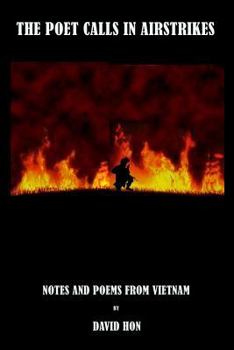The Poet Calls In Air Strikes: Notes and Poems from Vietnam
Waiting Out the Chess Master The material here was a bit too personally sensitive for publication while I was in the Marines, or for these many years thereafter. However, wars leave almost geologic strata of mental residue. Sometimes either a little digging, or a different angle of perception can unearth a bit more clarity, both to bystanders and to later generation. That is why I bring these forth now. -David Hon - Rock and Roll and folksongs had invigorated our bodies and souls, but there was ever a specter present. Even as free love changed our young lives from a pseudo-Victorian upbringing, the prospect of our young death in war grimly counterbalanced what was a jolly good time in the early 60s. Many young American men felt they were stalling off death. They kept their grades up to stay in college or remained in bad marriages if that would keep them from the military draft. They turned physical problems into assets: a mere doctor's note could save their lives by effecting a deferment. They went in the Peace Corps. Canada started getting male immigration from the States. Long before the Vietnam involvement was nationally unpopular, it was a danger lurking over most men in their late teens. More specifically, some like me thought to wait it out. Surely the little involvement in 1962 would not grow. Then surely, the draft and the larger influx of troops sent there meant it would all be over soon. Then surely, by 1964, it could not last much longer. It could not be longer than World War I, or World War II or Korea had been. I felt safe in the timing, and ...surely it would all be over before anyone noticed me. It became however, like a life-sized chessboard with the specter making unpredictable moves. I was in a land grant college which meant I had to attend Reserve Officer Training Corps meetings during the weeks of courses. Beginning college in 1960, I had learned about polishing shoes and marching into the sides of buildings at the commands of squeaky novices in the Seattle morning mud. Not the big hot college times we had signed up for. Thinking these people could not really be serious, I turned in my ROTC uniform and continued with my studies. A year later, some official sent me letter that I would not stay in school without being in a military program. I found one which would let me give up a short time in the summer and if I failed at it or dropped out, I would go straight into the Reserves, which surely would never be called up, because surely the war would be over soon. It was called the Platoon Leaders Corps and was run by the Marines to attract Officer Candidates and, in those days, to weed out weaklings. My problem was, at that rebellious age, I didn't want to be weeded out of anything, so I came through it with about 30% of the starting class which survived hazing and other mental cruelties. Later, during the school year, I casually dropped out of the program and they put me in a reserve unit where I learned to string wire to telephones. Once a month I would go to a formation and learn how to avoid peeling potatoes. The rest of the time, like most students, I worked at odd jobs to pay for college and felt I had done my duty and would sit out this war in the Marine reserves. Surely that was all now. Happy life was back in the offing. And it was so for a few years, until I graduated. Going to the University of Tulsa on a small fellowship, I was transferred to a reserve unit of truck drivers. I learned to drive split axle trucks and on many weekends we took a case of beer and sat on top of a big truck watching stock car races from a hilltop. These were mellow weekend afternoons of supposed driver training. What a way to spend the war. Except the war did not cooperate and end when it surely must have... This book of poetry is a personal account with poetry and was for the author, therapeutic. For those who know the Vietnam war only from the distance of news or history, perhaps it will be another perspect
Format:Paperback
Language:English
ISBN:1539455165
ISBN13:9781539455165
Release Date:December 2016
Publisher:Createspace Independent Publishing Platform
Length:38 Pages
Weight:0.14 lbs.
Dimensions:0.1" x 6.0" x 9.0"
Customer Reviews
0 rating





